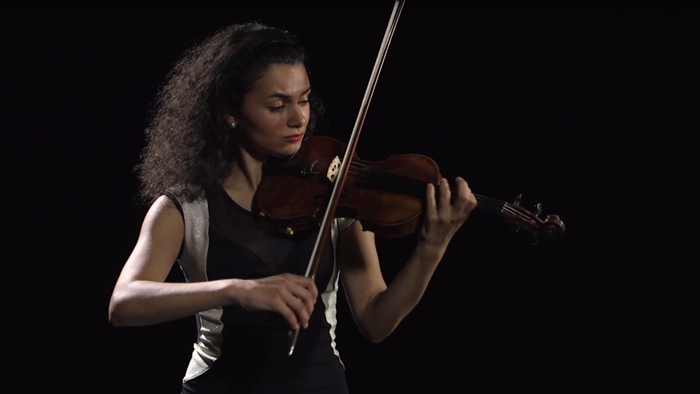“Do you mind if I shoot the interview?” Nuné Melik’s friend asked as we settled in The McGill Tribune’s office.
“It is pretty much just to brag [on social media] about how important and famous I am,” Melik added with a self-deprecating smile.
She might not be famous just yet, but after only a few minutes in her company, it becomes clear Melik is on her way to accomplishing great things.
In the past year alone, the up-and-coming classical violinist played at Carnegie Hall and the United Nations after winning the Waldo Mayo Violin Competition, published a volume of her own poetry, and released a crowdfunded record with her long-time musical partner, pianist Michel-Alexandre Broekart—all while pursuing her doctorate studies in music at McGill. She is now touring North America, playing in a handful of major cities before the year’s end.
The album, her first, is the result of seven years of relentless work, including extensive research on Armenian classical music, and two years of recording. The result, Hidden Treasure: Classical Armenian Music for Violin and Piano, is an emotionally-charged introduction to both her formidable talent and classical Armenian music.
“I’m really proud of this project, and I’m not easily satisfied with myself,” Melik said.
Of Armenian and Georgian descent, Melik is passionate about shining a light on the music she grew up with, and strives to give a voice to the neglected composers who shaped her.
“I want people to learn about this music, or at least acknowledge its existence,” Melik said. “Because today, it’s as if it’s not even there, you know? It’s wrong. [Our music] is beautiful. It has its value.”
Her album stands in opposition to her classical contemporaries, many of whom she criticizes for abandoning those who stand in the margin.
“We’ve been running circles around absolutely the same repertoire for centuries,” Melik said. “Everything that is not Beethoven, Mozart, or Shostakovich is not even worth being considered.”
With Hidden Treasure, Melik forges her own path as a curator, recording not what she knows will make her famous, but what she believes needs to be heard.
“The main message is really just to celebrate that we are still here, and that we continue to create things,” Melik said.
In addition to popularizing Armenian music by both playing and recording it, Melik seeks to make the music more accessible to classical performers. Over the past few years, she has traveled to Armenia three times, to gather sheet music that cannot be found in North America. Her travels were worthwhile.
“I have, I think, the most impressive library of Armenian music in North America right now,” Melik said.
Melik is now considering launching an electronic library on her website, to which access would be granted on a pay-what-you-can basis. Meanwhile, she continues to work on her doctorate thesis and is shooting a documentary feature on Arno Babajanian, an Armenian piano virtuoso whose three-piece “Violin Sonata in B-Flat Minor” and “Elegy” are featured on Hidden Treasure.
The album release might feel like the end of a chapter, but for Nuné, there is no slowing down.
“I’m leaving for Mexico [on] Monday. I’m going to give masterclasses [and] play with the orchestra,” Melik said. “I’ll most likely present the album also.”
She also has a Canadian tour planned with Jeunesse Musicale and a Chinese tour coming up in 2019.
“I just want to impact the world in a better way,” she says. “I don’t know if I’m gonna succeed, but at least I’m trying.”
While Melik continues to push the boundaries of the exclusive classical music canon, no one will contest that.








